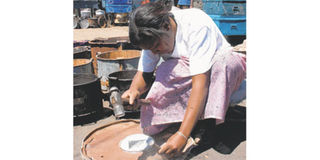Breaking News: At least 10 feared to have drowned in Makueni river
More than Sh300m in women funds lying idle with lenders

A jua Kali artisan busy at work at Burma Jua-kali in Nakuru. About 23 per cent of money meant for loans to businesswomen remain unutilised with lending institutions. Photo/FILE
More than Sh300 million allocated to the Women Enterprise Fund to be taken as loans is sitting idle in constituency and microfinance institution vaults.
Out of Sh1.5 billion allocated to the fund since its inception in 2009, only Sh1.15 billion has been lent to business women, leaving over 23 per cent unutilised.
The constituency channel of disbursement shows worse performance as over 33 per cent of funds have not reached the target, because out of the Sh465 million allocated, only Sh308 million has been loaned out.
The MFIs, which received a larger share of the funds for on-lending to the tune of Sh1.032 billion and charge 8 per cent interest on loans, have been able to dispense Sh842 million, or over 80 per cent.
“The gaps between allocation and amount disbursed under C-WES (Constituency Women Enterprise Scheme) and MFIs is attributed to differences in absorption capacities of women in various constituencies,” says Mr Wainaina wa Njeri, the CEO of the Women Enterprise Fund.
He adds that 45 MFIs have fulfilled its on-lending conditions. There have been complaints over lack of information on where to get the funds, especially among rural women.
The gaps between allocated and disbursed amounts is wider in some areas like North Eastern and Eastern provinces, according to a report by the Fund.
For instance, out of Sh22 million allocated to the North Eastern Province less that half (Sh9 million) was taken up.
A similar situation is Eastern Province where out of Sh80 million, only Sh40 million was borrowed compared to other areas like Nairobi where uptake is over 80 per cent.
The fund cites strong attitudes, cultural and religious beliefs in disbursing money in different parts of the country as hindrances.
“Gaps are obviously bigger in North Eastern and Eastern provinces because the Muslim faith is against interest on loans,” he says.
“Although the money to registered groups under C-WES is interest free, we have very few MFI partners in those areas and generally, the fear of loans by women,” says Mr Wainaina.
The revolving fund was initiated in 2009 to provide sustainable solutions to the challenges Kenyan women face in venturing into or expanding their businesses.
For a while, the fund was blemished by high default rates – currently at 30 per cent – attributed to misinformation and interference by politicians, who told women that the loans were free government money not to be repaid.
“Under C-WES a total of Sh130million has been recovered. We have recorded a loan repayment rate of over 70 per cent. There is no default from the MFIs,” says Mr Wainaina.
The fund advances the money to MFI to revolve over a period of three years through lending to women groups.
So far, over 6000 groups have accessed loans.




